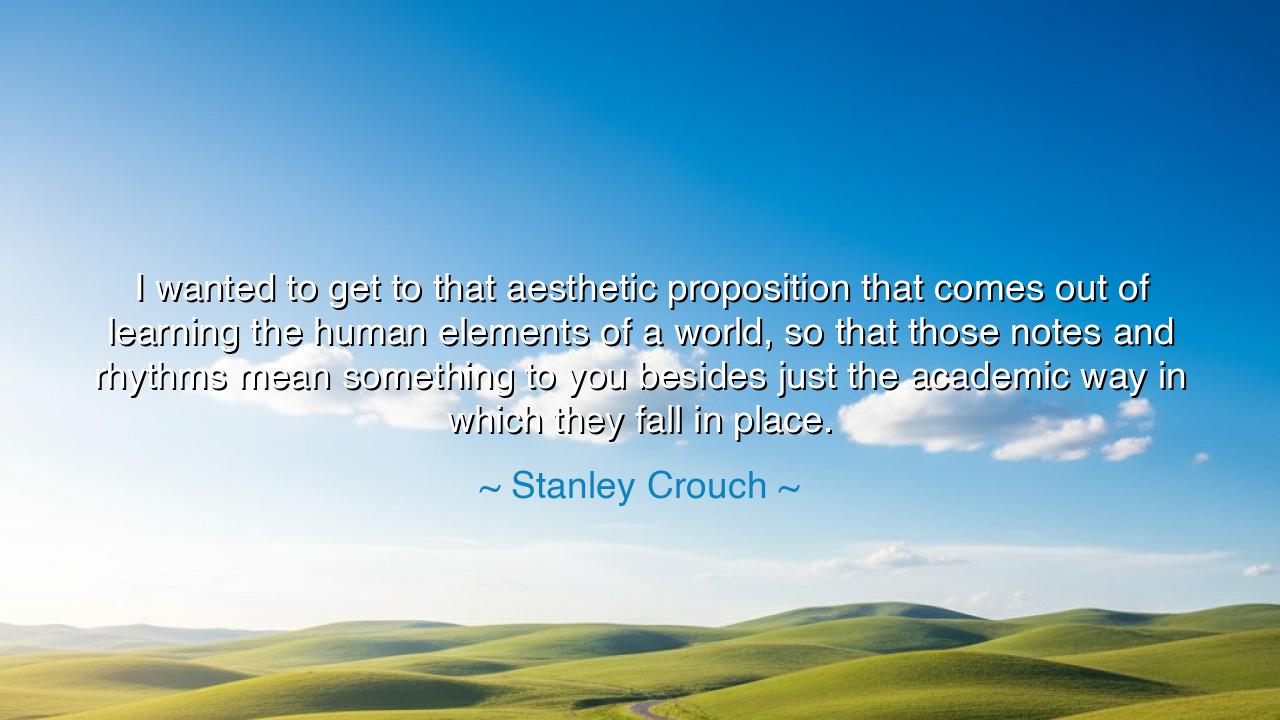
I wanted to get to that aesthetic proposition that comes out of
I wanted to get to that aesthetic proposition that comes out of learning the human elements of a world, so that those notes and rhythms mean something to you besides just the academic way in which they fall in place.






Hear the words of Stanley Crouch, poet of thought and warrior of culture, who declared: “I wanted to get to that aesthetic proposition that comes out of learning the human elements of a world, so that those notes and rhythms mean something to you besides just the academic way in which they fall in place.” In this utterance lies the eternal struggle of the artist: to transcend theory, to breathe life into form, to move beyond the cold scaffolding of knowledge into the warmth of human truth. For it is not enough that notes follow rules, or that rhythms align with measure—what matters is that they live, that they carry the soul of experience.
To speak of an aesthetic proposition is to speak of the essence of art, that ineffable quality which stirs the heart. Crouch reminds us that it does not spring from technical perfection alone, but from learning the human elements of a world—from living, suffering, rejoicing, struggling, and absorbing the stories of others. Music, painting, poetry, all become mere exercises in calculation if they are not infused with humanity. The great proposition of art is to make meaning, to speak beyond structure, to awaken life in the listener or the viewer.
Consider the story of Louis Armstrong, who learned not only the cornet but also the spirit of New Orleans itself—the laughter, the sorrow, the prayers rising from churches, the cries from the streets. His notes were not academic; they were alive, pulsing with the history of his people. He had learned the human elements of his world, and so when he played, the sound was more than melody—it was truth, pain, and joy made audible. Without that grounding, his genius might have been sterile; with it, he transformed music forever.
Crouch’s words also remind us that pure academic mastery is but a skeleton. The skeleton gives structure, but it does not breathe. One may know every scale, every chord progression, every rhythmic pattern, yet still leave the listener unmoved. Another, who perhaps knows less, but has lived and felt deeply, may strike a single note and move hearts to tears. Thus, the true artist must unite both worlds: the discipline of learning with the heartbeat of experience.
History is filled with examples of this union. The poet Homer, whether man or myth, could describe the rage of Achilles and the sorrow of Priam not because he had memorized formulas, but because he understood the human elements of grief, honor, and mortality. His verse followed structure, yes, but it was structure filled with soul. So too must every artist, in any field, rise beyond mere mechanics into meaning.
The lesson is luminous: seek not only to master the rules of your craft, but also to immerse yourself in the human experience that gives those rules weight. Read the stories of others, walk in unfamiliar streets, listen to voices unlike your own. In every encounter, you gather truths that will later breathe life into your work. Without this, your art may be perfect in form but empty in spirit. With it, even imperfection can become transcendent.
Practical action flows from this truth. If you are a musician, do not confine yourself to scales alone—sit with elders, learn the songs of your people, listen to the heartbeat of the world around you. If you are a writer, do not dwell only in books—listen to conversations, observe life in its rawness, and let it teach you. Whatever your calling, remember that meaning arises when knowledge is fused with humanity.
Thus, Stanley Crouch’s words stand as a beacon: that notes and rhythms must mean something more than their place on a page. They must carry the essence of life, the weight of human truth. Let every generation remember: the highest art is not the perfection of form, but the perfection of spirit woven through form. And only those who learn the human elements of the world may hope to achieve it.






AAdministratorAdministrator
Welcome, honored guests. Please leave a comment, we will respond soon